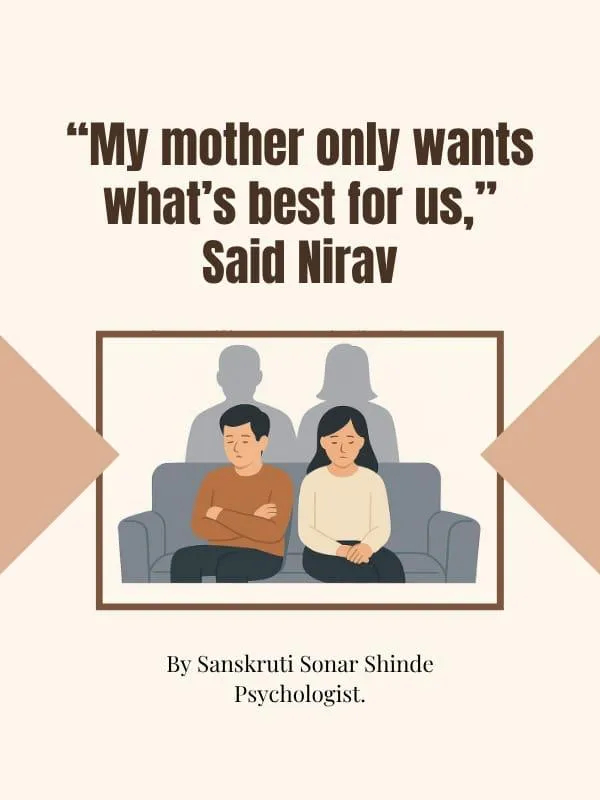
“My mother only wants what’s best for us,” Said Nirav
“My mother only wants what’s best for us,” Nirav began, but Trishna’s eyes were already misting.
“I know she means well,” Trishna replied, “but sometimes it feels like we don’t get to make our own choices. Like the wedding, or even naming our daughter…”
Nirav looked down at his hands, the weight of unsaid words thick in the air.
It was their third session with me. As a psychologist who often works with couples, I’ve seen this kind of tug-of-war more times than I can count. But that didn’t make their pain any less real.
Trishna and Nirav weren’t fighting because they didn’t love each other. They were fighting because they both did and because the third invisible presence in their relationship wasn’t a person, but a pattern: unspoken boundaries with family.
The Dilemma: Where Does Family End and "Us" Begin?
Trishna came from a nuclear, somewhat reserved background where decisions were mostly private and mutual. Nirav, on the other hand, was raised in a joint family where dinners were communal, opinions were shared freely, and involvement from elders was not just accepted, it was expected.
The tension wasn’t just about who said what. It was about whose rules they were living by.
“I feel like I don’t have a say in our own home,” Trishna had said in the first session.
“I feel like I’m stuck between my wife and my mother,” Nirav had admitted in the second.
Sound familiar?
FAQ: How Do We Set Healthy Boundaries with Extended Family?
I paused our conversation gently and turned to both of them.
“Can I answer a question I hear a lot from couples like you?” I asked. “It might help both of you see what’s really happening here.”
They nodded.
How do we set healthy boundaries with extended family?
This question shows up in many forms: “How do I tell my mom to back off without hurting her?” or “Why doesn’t he stand up for me when his parents interfere?”
Here’s the thing: Healthy boundaries are not about keeping people out they’re about creating clarity.
Boundaries aren’t walls. They’re doors with doorknobs. You get to decide when, how, and who walks through.
And for couples, this means defining TOGETHER:
What decisions are “ours” to make
What level of involvement from family feels okay
What needs to be communicated—and by whom
Therapy Didn’t Give Them Quick Fixes It Gave Them Clarity
Over the weeks, we didn’t jump straight to action plans. That would have been unfair to the very real grief and guilt they were processing.
Instead, we unpacked:
The roles they had grown up with and how those shaped their current reactions
The invisible rules they were trying to live by
The resentment that was slowly building between them, because neither of them felt truly heard
We practiced unlearning, before they could begin learning anything new.
There were uncomfortable sessions. Emotional pauses. Breakthroughs that came after weeks of tension.
And slowly, they began to say things like:
“We’re learning to stand beside each other, not opposite.”
“We don’t owe everyone an explanation, just honesty.”
“We’re allowed to decide what’s best for us.”
What Changed?
The dynamic at home didn’t magically become perfect. But the storm between them quieted. They were no longer fighting on opposite sides—they were finally a team, navigating the noise together.
Trishna began speaking up—not to rebel, but to express.
Nirav learned that protecting his marriage wasn’t a betrayal to his parents—it was honoring a new family he was building.
They both learned that boundaries aren’t lines you draw in anger. They’re values you protect with love.
To The Couples Who Feel Torn…
If you’ve ever felt like your relationship is being overshadowed by external voices if you find yourselves whispering in your own home, or keeping score of who’s “winning” each disagreement you are not alone.
This isn’t about blaming family. It’s about acknowledging the quiet pressure that so many couples carry and don’t talk about.
Therapy doesn’t tell you what to do. It helps you understand why you feel the way you do. It gives you the tools to make conscious choices together.
So if you’re asking:
How do we set boundaries without hurting anyone?
Why do I feel like I’m always choosing one over the other?
Can our relationship survive this much tension?
I want to tell you this: Yes. You can.
But not by staying silent. Not by pretending you’re okay. And not by carrying this alone.
Final Words from the Therapy Room
On their last day of therapy, Nirav turned to Trishna and said something that stayed with me:
“We didn’t come here to fix our families or each other. We came here to build a space for us in-between all the family members.”
And Trishna, eyes soft but strong, smiled back and replied:
“And now, we finally have a home that feels like ours.”
So if you’re standing in that in-between space between love and loyalty, between duty and desire remember, you don’t have to choose sides.
You just have to choose to begin.
Let’s keep flying higher… See you next time!
